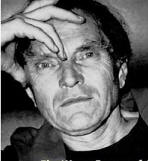
Paradigm Shift
The idea of a paradigm shift comes from a hugely influential paper written by Thomas Kuhn in 1962 and called 'The Structure of Scientific Revolutions'. Kuhn's conclusions were intended specifically for the hard sciences. Amongst the scientific community this was taken as a harsh blow by some, implying that there was not a single, objective and irrefutable system of knowledge discovery, but that what counted as true and how it could be developed and communicated changed through time.
People now tend to use the phrase 'paradigm shift' in a more New Agey sense, of a questioning and overthrow of the most basic assumptions of our worldview. It is in this sense that I have become increasingly convinced that we need such as shift. What we are seeking is a new system, not just a change in some of the parameters of the existing system. This explains why it is so difficult to explain green ideas to the mainstream, because you cannot explain, say, why you need a Citizens' Income to somebody who doesn't understand the problems with global capitalism, or the need for a bioregional, provisioning-focused economy. All these concepts make sense as part of a wholly different paradigm of economic life; individually they appear marginal, if not absurd.
But how deep should our questioning of the paradigm go?  Paul Feyerabend, scourge of the methodological community and child of the 1960s, takes the phrase 'accept nothing; question everything' to its logical conclusion. In the unpublished manuscript called The Conquest of Abundance that was left unfinished at his death, he suggested that it may be our habit for analysing the world that has reduced our ability to show reverence and wonder. It has thus in a fundamental way limited our perception of the abundance of nature.
Paul Feyerabend, scourge of the methodological community and child of the 1960s, takes the phrase 'accept nothing; question everything' to its logical conclusion. In the unpublished manuscript called The Conquest of Abundance that was left unfinished at his death, he suggested that it may be our habit for analysing the world that has reduced our ability to show reverence and wonder. It has thus in a fundamental way limited our perception of the abundance of nature.
'Variety disappears when subjected to scholarly analysis. This is not the fault of scholars. Anyone who tries to make sense of a puzzling sequence of events, her or his own actions included, is forced to introduce ideas that are not in the events themselves, but put them in perspective. . . There is no escape: understanding a subject means transforming it, lifting it out of a natural habitat and inserting it into a model or a theory or a poetic account of it. But one transformation may be better than another in the sense that it permits or even explains what for the other transformation remains an unsolvable puzzle' (p. 12)
Feyerabend develops his theme by exploring the point at which Greek culture underwent a shift from the mysterious, poetic understandings of Homeric times to the intellectually impressive mind-games of logic, evidence and proof. You might argue that this is the first step along the road that has led us to evidence-based policy-making and the impossibility of making anything change unless you can show that position B is better in terms of something measurable (and probably in money terms) than position A. In this world we cannot save hummingbirds unless they have a finanacial value, and hence they, and a thousand other species, are doomed.
The legalistic, taxonomising worldview has labelled us as Homo sapiens. This tells us a lot about how we think of ourselves as a species, and perhaps some of the assumptions we need to challenge if we are to be a species with a flourishing future to match our glorious past. To what extent being a species that focuses so exclusively on one gender may be a problem is a question that intrigues others. I am more interested in the 'sapiens' part of this formulation. Such a characterisation accords with our exaltation of the intellect, since 'sapiens' is usually translated as knowing. However, the online dictionary tells me that the derivation is actually from 'sapere', to be wise or to taste. To think of ourselves as a species that tastes the richness of life and does so with true appreciation seems to offer us a better hope than any amount of numerical analyses.
